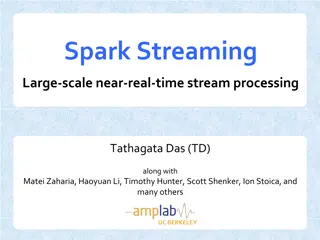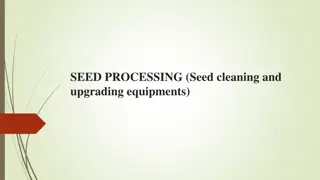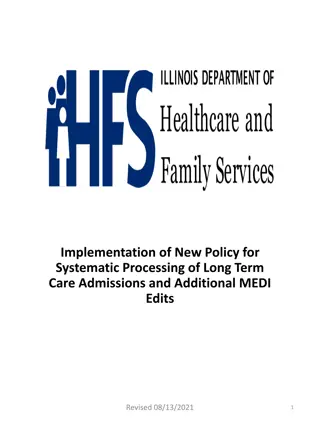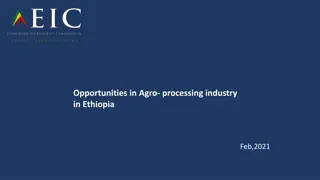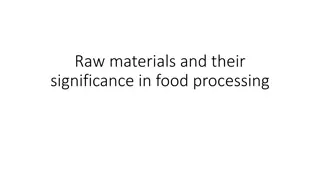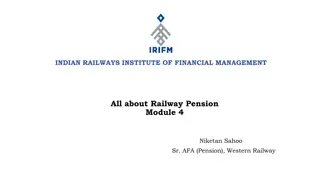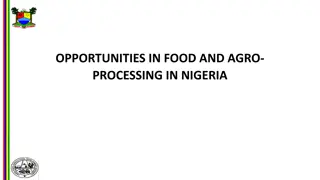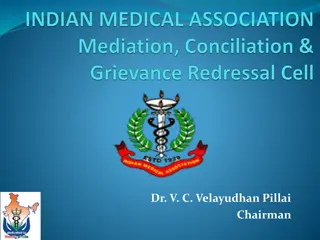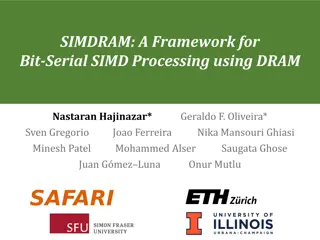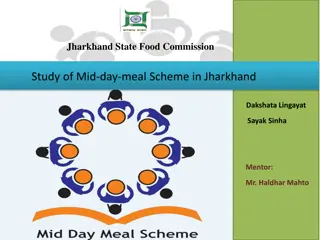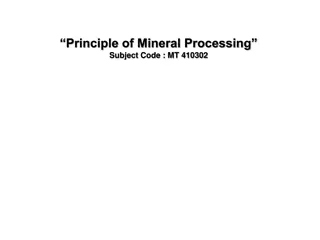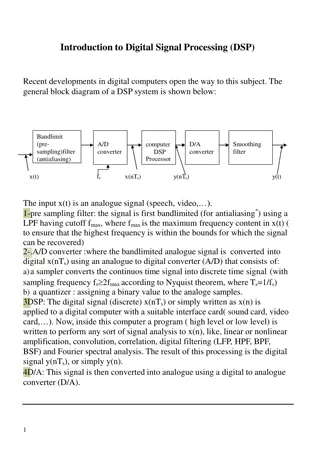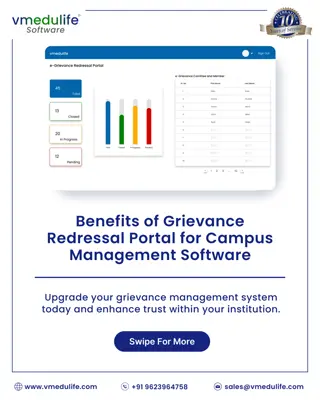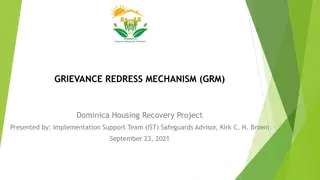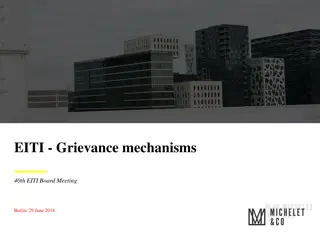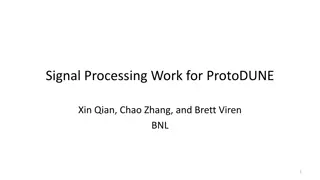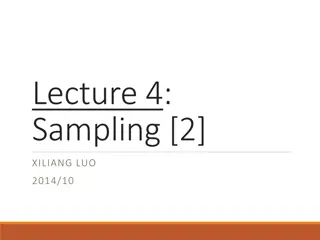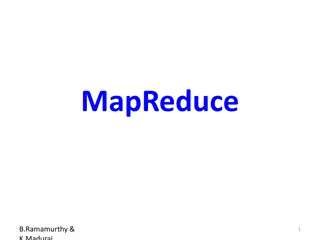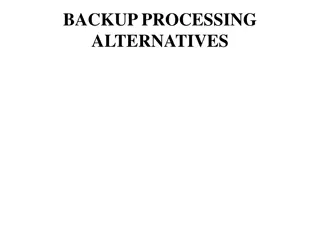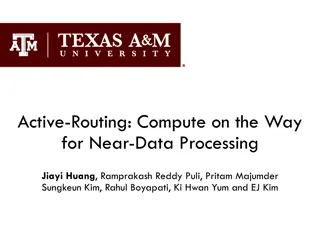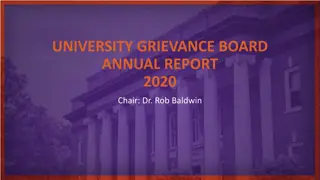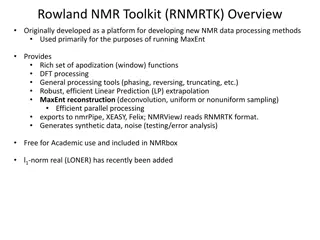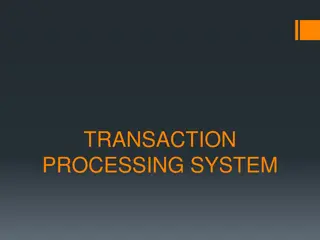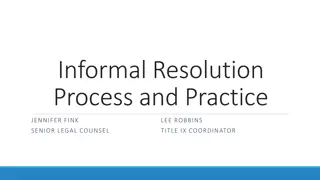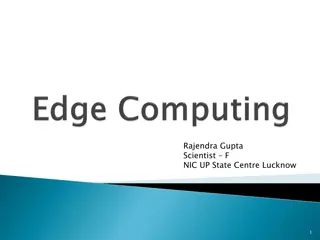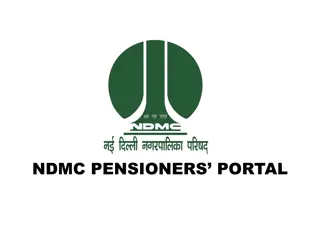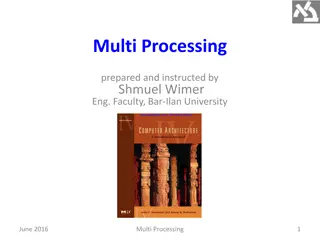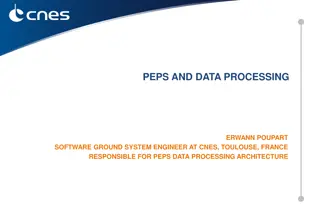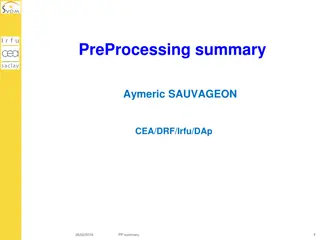National Food Processing Policy and Its Importance
National Food Processing Policy aims to address the significant wastage in food production through value addition and efficient processing. The policy highlights the reasons for food processing, including reducing losses in the supply chain and enhancing quality. It emphasizes creating an enabling e
1 views • 19 slides
Grievance Redress Mechanism: Enhancing Project Efficiency
Understanding the Grievance Redress Mechanism (GRM) is crucial for effective project management. This mechanism aims to address complaints and concerns related to project implementation, ensuring transparency and stakeholder engagement. By sensitizing facility GRM focal persons and following structu
4 views • 26 slides
OBPMark and OBPMark-ML: Computational Benchmarks for Space Applications
OBPMark and OBPMark-ML are computational benchmarks developed by ESA and BSC/UPC for on-board data processing and machine learning in space applications. These benchmarks aim to standardize performance comparison across different processing devices, identify key parameters, and provide recommendatio
10 views • 20 slides
Introduction to Spark Streaming for Large-Scale Stream Processing
Spark Streaming, developed at UC Berkeley, extends the capabilities of Apache Spark for large-scale, near-real-time stream processing. With the ability to scale to hundreds of nodes and achieve low latencies, Spark Streaming offers efficient and fault-tolerant stateful stream processing through a si
0 views • 30 slides
Real-Time Data Insights with Azure Databricks
Processing high-volume data in real-time can be achieved efficiently using Azure Databricks, a powerful Apache Spark-based analytics platform integrated with Microsoft Azure. By transitioning from batch processing to structured streaming, you can gain valuable real-time insights from your data, enab
0 views • 23 slides
Efficient Layout Planning for Seed Processing Plant
Seed processing is crucial for removing contaminants and drying seeds to a safe moisture level. Planning a seed processing plant layout involves considering factors like types of seeds, operation size, equipment selection, location, labor availability, and more. Components of the building layout inc
2 views • 25 slides
New Policy for Systematic Processing of Long Term Care Admissions
This policy outlines significant changes in the processing of long-term care admissions through MEDI, aiming to streamline the submission process, improve efficiency, and reduce delays in reimbursement. Key updates include systematic editing upon submission, eligibility criteria for systematic proce
2 views • 34 slides
Opportunities in Ethiopia's Agro-Processing Industry
Ethiopia stands out as a leader in raw material production for agro-processing industries, offering opportunities in dairy, juice processing, edible oil processing, poultry, beef production, and tomato processing. With abundant resources, suitable climate conditions, and a growing domestic market, E
0 views • 8 slides
Significance of Raw Materials in Food Processing
Effective selection of raw materials is crucial for ensuring the quality of processed food products. The quality of raw materials directly impacts the final products, making it important to procure materials that align closely with processing requirements. Quality evaluation, including microbiologic
2 views • 30 slides
Overview of Indian Railways Institute of Financial Management - Pension System
Indian Railways Institute of Financial Management (IRIFM) provides an advanced Railway Pension system through ARPAN and IPAS modules to manage pension-related activities efficiently. ARPAN offers modules for settlement, revision, reconciliation, grievance handling, and family pension, while IPAS int
0 views • 17 slides
Recent Developments in GAMIT/GLOBK for GNSS Processing
Significant updates and future developments in GAMIT/GLOBK for GNSS processing include processing of multiple constellations independently, transition to secure HTTP for code distribution, addition of azimuth field for station alignment, and regular updates schedule. Higher-order ionosphere and rapi
0 views • 10 slides
Understanding Computer Vision and Image Processing
Introduction to the fields of computer vision and image processing, exploring their differences and how they intertwine. Computer vision focuses on processing images for computer use, while image processing enhances images for human consumption. Topics include image analysis, restoration, enhancemen
1 views • 100 slides
Unlocking Opportunities in Food and Agro-Processing in Nigeria
Explore the potential for food and agro-processing in Nigeria to generate income, enhance food security, and boost the economy. Learn about the objectives, strategies, and reasons behind agro-processing activities, as well as the growing demand for convenience and processed foods in the country. Dis
2 views • 46 slides
Indian Medical Association Mediation and Grievance Redressal Rules
These rules outline the procedures for mediation, conciliation, and grievance redressal within the Indian Medical Association (IMA). They define key terms, establish a committee for resolving complaints between patients and doctors, and detail the process for handling grievances. The focus is on ens
2 views • 17 slides
SIMDRAM: An End-to-End Framework for Bit-Serial SIMD Processing Using DRAM
SIMDRAM introduces a novel framework for efficient computation in DRAM, aiming to overcome data movement bottlenecks. It emphasizes Processing-in-Memory (PIM) and Processing-using-Memory (PuM) paradigms to enhance processing capabilities within DRAM while minimizing architectural changes. The motiva
2 views • 14 slides
Study of Mid-day Meal Scheme in Jharkhand
The study focuses on the implementation status, issues, and recommendations for the Mid-day Meal scheme in Jharkhand. It covers aspects such as delivery of entitlements, transparency, accountability, and grievance redressal mechanisms. Key findings include observations on food grains, funds, supplem
2 views • 19 slides
Grievance Processing: Understanding the Process and Types
A grievance is a formal claim by the Union that the Employer violated the collective bargaining agreement. Grievance processing involves contract interpretation and discipline issues. Causes of contract interpretation grievances include situations where the contract is silent, unclear, or the Union
2 views • 39 slides
Principles of Mineral Processing in Extractive Metallurgy
Introduction to the principles of mineral processing focusing on the scope, physical characteristics, and economics of ore processing. The syllabus covers terminology, mineral resources in India, and the processing of industrial minerals like Haematite, Galena, and Chalcopyrite. Learn about ore depo
3 views • 20 slides
Overview of Digital Signal Processing (DSP) Systems and Implementations
Recent advancements in digital computers have paved the way for Digital Signal Processing (DSP). The DSP system involves bandlimiting, A/D conversion, DSP processing, D/A conversion, and smoothing filtering. This system enables the conversion of analog signals to digital, processing using digital co
1 views • 24 slides
Benefits of Grievance Redressal Portal for Campus Management Software
Redressal of Grievances is simplified with vmedulife\u2019s \u2018 grievance,\u2019 an advanced system catering to AICTE and UGC-approved institutions. Our solution promotes transparency and establishes a positive ambience on campus. Led by a team of
0 views • 7 slides
Grievance Redress Mechanism (GRM) in Dominica Housing Recovery Project
The Grievance Redress Mechanism (GRM) provides stakeholders with channels to file complaints related to project policies and procedures. Managed throughout all stages by the Social Safeguards Specialist, the GRM ensures timely responses and resolution of grievances. Key terms include feedback, griev
0 views • 7 slides
Enhancing Grievance Mechanisms in EITI: 40th Board Meeting Insights
Explore the presentation of existing grievance mechanisms at the 40th EITI Board Meeting in Berlin. Discussions centered around whether current procedures meet governance requirements and the potential establishment of new mechanisms. Findings highlighted the need for improved clarity, stakeholder u
0 views • 6 slides
Effective Strategies for Children with Developmental Language Disorder, Sensory Processing Disorder, and Fine Motor Delays
Children with Developmental Language Disorder (DLD), Sensory Processing Disorder (SPD), and Fine Motor Delays often have accompanying sensory and fine motor deficits. Research indicates that addressing sensory processing deficits can significantly benefit children with DLD, ADHD, autism, and other d
0 views • 61 slides
Understanding and Pursuing Grievances in Union Representation
This informative material covers essential topics related to preparing and pursuing a grievance in the context of union representation, including the duty to fairly represent the entire bargaining unit, defining terms like arbitrary, discriminatory, and bad faith, obligations in filing grievances, g
0 views • 16 slides
Advancements in Signal Processing for ProtoDUNE Experiment
The team, including Xin Qian, Chao Zhang, and Brett Viren from BNL, leverages past experience in MicroBooNE to outline a comprehensive work plan for signal processing in ProtoDUNE. Their focus includes managing excess noise, addressing non-functional channels, and evolving signal processing techniqu
1 views • 23 slides
Understanding Sampling and Signal Processing Fundamentals
Sampling plays a crucial role in converting continuous-time signals into discrete-time signals for processing. This lecture covers periodic sampling, ideal sampling, Fourier transforms, Nyquist-Shannon sampling, and the processing of band-limited signals. It delves into the relationship between peri
1 views • 60 slides
Understanding MapReduce in Distributed Systems
MapReduce is a powerful paradigm that enables distributed processing of large datasets by dividing the workload among multiple machines. It tackles challenges such as scaling, fault tolerance, and parallel processing efficiently. Through a series of operations involving mappers and reducers, MapRedu
7 views • 32 slides
Developing a Successful Backup Processing Strategy
This unit explores backup processing alternatives, contingency planning, and the importance of selecting and implementing alternate processing support in advance. It emphasizes the need for well-documented strategies to ensure rapid recovery from disruptions in data processing, along with identifyin
1 views • 128 slides
Enhancing Near-Data Processing with Active Routing
Explore the implementation and benefits of Active-Routing for efficient data processing in memory networks. Motivated by the increasing demands for memory in graph processing and deep learning, this approach aims to reduce data movement, energy consumption, and costs associated with processing large
0 views • 46 slides
University Grievance Board Annual Report 2020 Summary
The University Grievance Board's 2020 annual report, chaired by Dr. Rob Baldwin, highlights a total of 8,777 petitions submitted from 2009 to 2020. In 2020, two grievances were submitted based on failure to implement policies adversely affecting the petitioners. One formal complaint was ruled withou
0 views • 6 slides
Grievance Board Decisions in Education Law
Explore recent Grievance Board decisions in education law involving salary computation errors and past mistakes affecting entitlements. Consider the factors influencing discretionary decisions by employers. Caution: This information is not legal advice; contact an attorney for legal counsel.
0 views • 112 slides
Overview of RNMRTK Software for NMR Data Processing
Rowland NMR Toolkit (RNMRTK) is a comprehensive software platform primarily used for NMR data processing tasks such as running MaxEnt, apodization, DFT processing, linear prediction, and more. It offers a robust set of tools for various processing needs and supports efficient parallel processing. RN
0 views • 17 slides
Understanding Transaction Processing Systems (TPS)
Transaction Processing Systems (TPS) are vital components in capturing, storing, and processing data generated from various business transactions. They ensure efficient handling of high volumes of data while maintaining accuracy, security, and privacy. TPS operate through automated data entry, batch
0 views • 24 slides
Centre of Excellence in Signal Processing Activities and Progress Report
Broad areas of signal processing activities at the Centre of Excellence in Signal Processing include audio, speech, language, medical image processing, computer vision, wireless communications, and machine learning. The center focuses on addressing various challenges in audio/speech recognition, emo
0 views • 17 slides
Understanding Informal Resolution Process and Practice in Grievance Procedures
Exploring the process of informal resolution in grievance procedures, focusing on mediation, confidentiality, impartiality, and neutrality. Parties can voluntarily engage in informal resolution before a formal determination, with specific requirements and timeframes outlined. Mediation fosters self-
0 views • 9 slides
Understanding Edge Computing for Optimizing Internet Devices
Edge computing brings computing closer to the data source, minimizing communication distances between client and server for reduced latency and bandwidth usage. Distributed in device nodes, edge computing optimizes processing in smart devices instead of centralized cloud environments, enhancing data
0 views • 32 slides
NDMC Pensioners Portal: Features, Benefits, and Usage Instructions
Explore the NDMC Pensioners Portal for access to pension information, grievance filing, Form-16 download, and more. Find out how pensioners and authorized staff can benefit from this one-stop source for pension-related services. Learn about registration, login procedures, and grievance redressal wit
0 views • 15 slides
Understanding Multi-Processing in Computer Architecture
Beginning in the mid-2000s, a shift towards multi-processing emerged due to limitations in uniprocessor performance gains. This led to the development of multiprocessors like multicore systems, enabling enhanced performance through parallel processing. The taxonomy of Flynn categories, including SIS
0 views • 46 slides
Insight into PEPS Data Processing Architecture by Erwann Poupard
Erwann Poupard, a Software Ground System Engineer at CNES, Toulouse, France, plays a crucial role in the PEPS data processing architecture. The outline covers PEPS HPSS data storage statistics, current data processing trends, and future plans including PEPS V2 development. Explore PEPS processing ch
0 views • 8 slides
Data Processing and Preprocessing Summary
In this document, Aymeric Sauvageon from CEA/DRF/Irfu/DAp presents a detailed overview of the preprocessing steps involved in data processing from L0 to L1. It covers the definition of L0/L1 and coding, utilization of the database for processing, input file specifications from China, packet content
0 views • 11 slides



